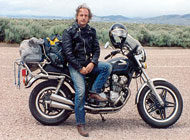Clarifying Issues from Meeting of the Minds
I discussed the recent Meeting of the Minds conference that was held recently here in Denver by the Motorcycle Riders Foundation. At the time there were a couple issues I was unfamiliar with that I wanted to learn more about. I now have more to report.
 First off, I was apparently a little off in my description of the issue of mandatory rider training. I said that MRF members “are concerned about a move to make such training mandatory, because they fear that the capacity does not exist to offer that training to that many people.” That was what I thought I had heard, and maybe to some extent that concern exists.
First off, I was apparently a little off in my description of the issue of mandatory rider training. I said that MRF members “are concerned about a move to make such training mandatory, because they fear that the capacity does not exist to offer that training to that many people.” That was what I thought I had heard, and maybe to some extent that concern exists.
However, I spoke last week with Terry Howard, State Coordinator for ABATE of Colorado, and she gave me a totally different take on the topic. Speaking strictly for ABATE of Colorado, Terry said the only issue she has with mandatory training is that it apply to motorcyclists AND to motorists. That was really a “Doh!” moment for me. Of course. It would be totally discriminatory to require motorcyclists to have rider training while not requiring drivers to have driver training. We’re both operating motorized vehicles on the same roads and highways. And lord knows we all know that those folks in their cars need better training on avoiding those of us not enclosed in steel cages.
But it occurs to me as well, that as much as we talk about how many motorcycle accidents are caused not by the biker but by the rider, the same is actually true of car on car accidents. Probably in most two-car accidents, only one of the drivers is significantly at fault. The other is probably just as much a victim of the other driver’s carelessness as we are when it’s a car on bike accident. So absolutely, if our legislators want to impose mandatory training on bikers, we have got to ensure that ALL motor vehicle operators have the same requirement. Of course, then we really get into the issue of training capacity, as I mentioned originally.
The other unclear issue from MotM is something Terry was not as able to clear up. That was the idea of tiered licensing. She said she doesn’t really know the issue because Colorado doesn’t have it. The only thing she could tell me is that she thinks it is possible Colorado could move in that direction because of the upswing in popularity of scooters. Anyone on a scooter bigger than 50cc has to have motorcycle validation on their license, but below 50cc there is no requirement. Terry told me that some ABATE members have raised the issue because they see these low-maximum-speed scooters as hazards slowing down traffic on busy arterials. But there is no such proposal currently and ABATE is not pushing for it. So I guess for now tiered licensing will remain an issue for other states, not Colorado.
Biker Quote for Today
Bikes parked out front mean good chicken-fried steak inside.
Tags: Motorcycle Riders Foundation, MRF

November 7th, 2008 at 1:34 pm
Tiered licensing consists of restricting riders to certain size engines on their bikes based upon their age. As an example, a 16 year old may only be able to ride a bike with 50cc’s or less, and this would be noted in some way on their operator’s license. In Europe the “unlimited” class (i.e., any engine larger than 650 cc) is limited to those 24 or older. For that reason many riders wait until they are 24 before the consider getting a bike.
This type of licensing relies upon the flawed assumption that age equals maturity and ability to handle a larger/more powerful machine.
Hope that this helps. I’ll be the state Legislative Affairs Specialist for ABATE of CO until January 1st. Someone else takes over at that time. Yes, I was at MOTM, too.
November 9th, 2008 at 3:20 pm
Thanks Don, for explaining a bit further what tiered licensing is and how it works in Europe. The issue I’m trying to get at is that during the MOTM it appeared from what some people said that the MRF sees issues with the concept. I want to understand what those issues are.